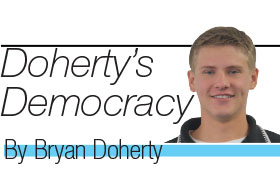As the results of the 2012 election slowly rolled in on the night of Nov. 6, it was clear that Barack Obama would be reelected President of the United States. The Obama administration was not the real winner that night – the Maryland economy was.
Maryland voters cast their ballot for seven referendum questions in addition to their vote for the president, the senate seat, and several representative seats. All seven passed. However, the best ones for the state economy were also the most heatedly contested and controversial.
Question 4, 6, and 7 resulted in a flood of advertisements from both sides of each issue. When Maryland voters entered the voting booth Nov. 6, they made the right decision. All three of these referendum questions will bring objective good to the state’s economy and national standing.
Question 4, commonly referred to as the Dream Act, allows for children of illegal immigrants that were brought here as children, have completed a public school education, earned 60 credits from a community college, are on the path to citizenship, and have paid taxes to qualify for instate tuition at Maryland colleges.
There is nothing in the bill that takes money away from any Maryland student, but merely gives these immigrant students the opportunity to pay the same amount as their peers. No money, through financial aid or scholarships, is denied to other students, and the restrictions stated only allow for immigrants who will undoubtedly turn into tax-paying, loyal, and productive citizens to receive any benefit. Question 4 will show to be a good investment on Maryland voters’ part within the coming years.
Similar economic reasons prove that passing Question 6, the referendum decision that legalized same-sex marriage, was a good choice. The Catholic Church and therefore the Archdiocese of Baltimore are adamantly opposed to this legislation on a moral basis. However, regardless of personal belief on the ethics of same-sex marriage, Question 6 undeniably opens the door to new economic opportunities.
The most tangible economic benefit that comes from the passing of Question 6 is the fact that it costs money to get married. Everything from a marriage license to the wedding cake to the rental of a venue gives money to Maryland. The legalization of same-sex marriage creates an increase in the purchase of these costly items, flooding the economy.
There are reports that same-sex couples have already begun to book wedding ceremonies and apply for marriage licenses for January 2013, when the law goes into effect. This is a trend that will undoubtedly continue in the coming months and years.
Question 7, which allows for new casinos to be built and table games to be introduced to existing casinos, will also help stimulate the economy. The main argument against Question 7 is that the money will not go towards education, as it was originally advertised by the drafters and supporters of the legislation.
The money not going to education is not the important economic issue. Question 7 allows for an increase in state tax revenue without the government having to raise taxes on individuals directly. What the state uses the increase in revenue for should not be the main focus of the discussion surrounding Question 7, rather the fact that the bill will help increase the revenue to begin with should be.
It also opens the door for more jobs for construction workers to blackjack dealers. It would also increase interest in Maryland casinos from out of state patrons, which not only promote business for the casinos but also for Maryland hotels, restaurants, and stores.
The three most contested referendum questions on Maryland’s ballot in the 2012 election were the most imperative and economically beneficial. Passing questions 4, 6, and 7 will prove to be a good choice by Maryland voters, as they help to improve Maryland’s slow economic recovery from the recession.
Bryan Doherty is an Opinion Editor for The Patriot and jcpatriot.com



